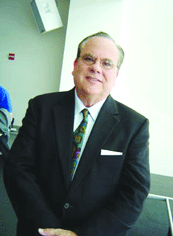Court upholds attorney general on amendments spelling out domestic partnership impacts
The battle over same-sex marriage in California is proceeding along two separate paths, with one, initiated by gay rights groups, leading eventually to the State Supreme Court and the other, instigated by opponents of the LGBT community, possibly to the voters in 2006 in the form of two proposed amendments to the state Constitution.
On August 18, the amendment path became a bit rockier for the anti-gay forces when Sacramento Superior Court Judge Raymond Cadei largely upheld Democratic Attorney General Bill Lockyer’s proposed petition and ballot summary for one of the proposed amendments.
Two different groups have proposed marriage amendments. One group, calling itself ProtectMarriage.com, is proposing a single sentence amendment: “A marriage between a man and a woman is the only legal union that shall be valid or recognized by the state.”
If enacted, this would undoubtedly generate litigation about the meaning of “only legal union,” specifically whether that would invalidate the state’s far-reaching domestic partnership statute and government policies flowing from the law.
The second group, calling itself VoteYesMarriage.com, has proposed a much lengthier amendment in two parts. The first part states “Only marriage between one man and one woman is valid or recognized in California, whether contracted in this state or elsewhere.” The second part provides that the institution of civil marriage may not be abolished, and that the government may not “bestow statutory rights or incidents of marriage on unmarried persons, or require private entitles to offer or provide rights or incidents of marriage to unmarried persons.”
In both cases, the amendment supporters submitted proposed wording for petitions and for the ballot pamphlet that emphasize the marriage definition aspects of their amendments without clearly stating the impact those amendments could have on existing domestic partnership rights for same-sex couples in California.
A series of statutes enacted over the past five years have gradually expanded such partnership rights to near-equivalence with marriage for purposes of state law. Under California laws, if two amendments are proposed on basically the same subject, the one that wins the most votes is enacted if it is supported by a majority of the voters.
Finding that the proposed petition and ballot language would be misleading to voters, Lockyer exercised his prerogative to rewrite them.
VoteYesMarriage.com proposed to call its initiative “The Voters’ Right to Protect Marriage Initiative.” Lockyer wrote a new title for both initiatives—“Marriage. Elimination of Domestic Partnership Rights”—and provided a detailed summary of the various rights of domestic partners that would be overturned by passage of the amendments.
ProtectMarriage.com did not bring any legal challenge to Lockyer’s action, but VoteYesMarriage.com filed suit in Sacramento Superior Court, protesting Lockyer’s version and arguing that the version they submitted should be on the petitions and the ballot.
Ironically, Lockyer’s office is defending the current state marriage law, which denies marriage rights to same-sex partners, in a case that will eventually reach the Supreme Court. The attorney general takes the position that the state is not obligated to allow same-sex couples to marry as a matter of state constitutional law, but he is committed to defending the domestic partnership statute, and his rewriting of the initiative language could contribute greatly to the outcome of the initiative campaign because domestic partnership rights enjoy widespread support in California, to judge by public opinion surveys.
If voters are clearly informed that passage of either proposed amendment would overturn domestic partnership rights, it widely believed that many will not sign the petitions so that one or both of the proposals may not even make it to the ballot. If the amendments make it onto the ballot, the revised ballot language is also expected to dampen voter enthusiasm for them.
Cadei, ruling from the bench, found that Lockyer’s proposed title was fair and, under state law, the attorney general has the right to adopt an initiative’s title as long as it meets that standard. However, Cadei thought that Lockyer had gone too far in his paragraph summarizing the amendment’s possible impact in a way that might mislead voters into thinking that the amendment would lead to more rights being lost than might be the case.
“I guess my problem is, at what point does something that is technically accurate become misleading?” Cadei asked in court, according to a local legal newspaper, The Recorder.
Cadei ordered representatives of the parties to attempt to negotiate language to describe the impact of the amendment, finding that Lockyer’s proposed language went too far but that the language proposed by the amendment’s proponents was inadequately informative. He ordered that the parties return to court on September 1 with proposed revisions for him to consider in case direct negotiation does not yield agreement.
Numerous gay rights groups intervened to argue in support of Lockyer’s proposed initiative title and summary, including Lambda Legal, National Center for Lesbian Rights, and the California chapter of the American Civil Liberties Union.
gaycitynews.com



































